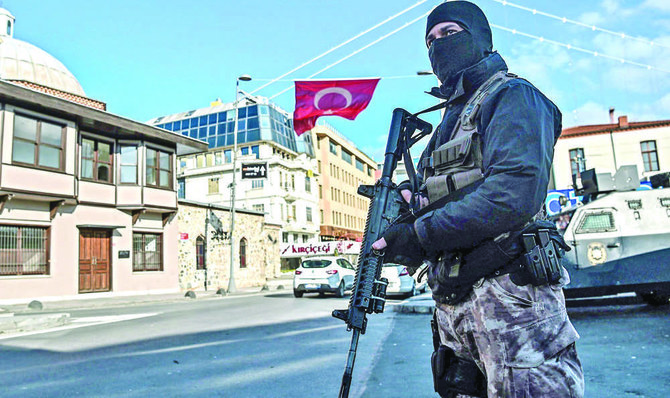ANKARA: The disappearance of Mohammed Bagher Moradi, an Iranian dissident journalist who took shelter in Turkey nine years ago, has fueled concerns that he is another victim of Iranian intelligence and abduction operations that have been active in the region.
Moradi, who sought asylum in Turkey after fleeing Iran during a trial over his critical news coverage, disappeared on May 30. His father believes his son was abducted by Iranian operatives since he had been followed by Iranian intelligence for a while in capital Ankara. His family filed a criminal complaint with the local Turkish prosecutor’s office.
In 2013, Moradi, a member of Saraye Ahl-e Ghalam (Writer’s Association), was given a five-year prison sentence term on the charge of “illegal gathering and collusion against national security.”
For Iranian dissidents, Turkey has become a safe haven or a transit point to reach European countries if their legal status remains unclear.
The reciprocal visa-free travel regime between Iran and Turkey provides Iranians with the chance to stay and move freely for up to 90 days in Turkey.

Mohammed Bagher Moradi. (Supplied photo)
However, this has not gone unnoticed by Iranian intelligence operatives who established espionage networks in the country to kidnap or assassinate dissidents despite the bilateral commitments between the two countries to cooperate against human trafficking and terrorism.
Oubai Shahbandar, a defense and security analyst, thinks it’s clear that Iranian intelligence operatives are still carrying out terror and kidnap operations that target Turkey.
“The assassination of (the dissident) Masoud Molavi Vardanjani in the middle of a busy street in Istanbul in 2019 was clearly a hostile act that was met with a response. That the Iranians are still carrying out brazen attacks shows how little Tehran cares for international norms and respect for sovereignty,” he told Arab News.
Turkish authorities arrested several suspects over their links to Vardanjani, who was a former intelligence operative for Iran. This included a staff member of the Iranian Consulate in Istanbul named Mohammed Reza Naserzade, who was held in February 2021, but Tehran denied any involvement with the murder.
Before he was shot dead in Istanbul, the Iranian dissident began sharing bombshell social media posts on the corruption of Iranian officials.
Last year, a high-ranking pilot from the Iranian army who took shelter in Turkey in 2018 filed a complaint with Turkish authorities claiming that some people tried to abduct him and his spouse several times in a bid to deliver him to Iranian intelligence. Eight people were arrested in September 2021 in connection with the incident.
Earlier this year, Turkish intelligence thwarted another plot by Iranian operatives to kill an Israeli-Turkish businessperson on Iran’s orders.
Yair Geller, a 75-year-old Istanbul-based tycoon who invested in machine and defense industries in Turkey, was targeted by a nine-person network that was gathered by Iran’s intelligence agency in response to the assassination of Iranian nuclear scientist Mohsen Fakhrizadeh in what Tehran claimed was an Israeli operation.
The attempt was foiled following a month-long surveillance operation by the Turkish intelligence agency.
Jason Brodsky, policy director of the group United Against a Nuclear Iran, told Arab News that the case of Moradi is just one more example of Iran’s long history of using Turkey as a launch pad to target Iranian dissidents.
However, he doesn’t think the operation itself was primarily motivated by Turkey’s warming relations with Israel.
“It is more that Iran has found a permissive environment in Turkey to operate, not to mention the geographic advantages for its security forces in being able to quickly smuggle their targets into Iranian territory,” Brodsky said.
Last week, Israel’s National Security Council issued a travel warning for Turkey, claiming there was a concrete threat to Israelis by “Iranian terrorist operatives” there and in nearby countries.
According to Brodsky, Israel’s recent travel warning for Israelis in Turkey is one more example of how infiltrated Turkey is with Iranian intelligence.
“These revelations come ahead of the Iranian foreign minister’s visit to Turkey on Monday — his first since taking office. Despite Iran’s reach inside Turkey, there are still irritants in the bilateral relationship over water, Iran-backed militias’ targeting of Turkish forces in Iraq and other issues. The news about the Moradi case will add yet another complication during the Iranian foreign minister’s visit,” he added.
In February, 16 suspects belonging to a network were arrested over their ties to Iranian intelligence in bringing back Iranian dissidents back to their homeland. The network was discovered following a detailed investigation by Turkish intelligence. They were accused of political and military espionage, as well as of abduction.
In its previous operations in Turkey, the network smuggled another Iranian dissident, former Col. Mashali Firouze, back to Iran, while its attempts to abduct former naval officer Mohammed Rezaei and economist Shahnam Golshani were botched.
Regarding the timing of the Iranian operatives’ abduction attempts in Turkey, Shahbandar said it is definitely not random.
“It is a sign of Iran’s desperation as the economy collapses and protests spread further across the country,” he said.


























